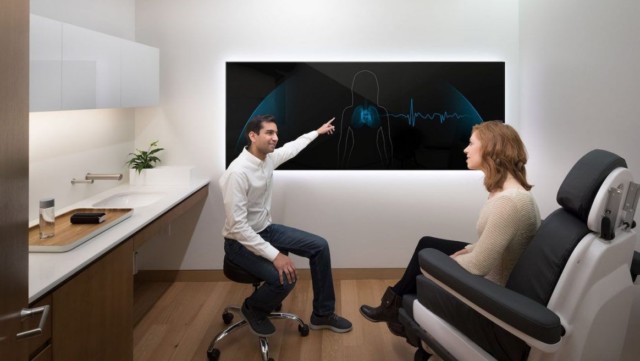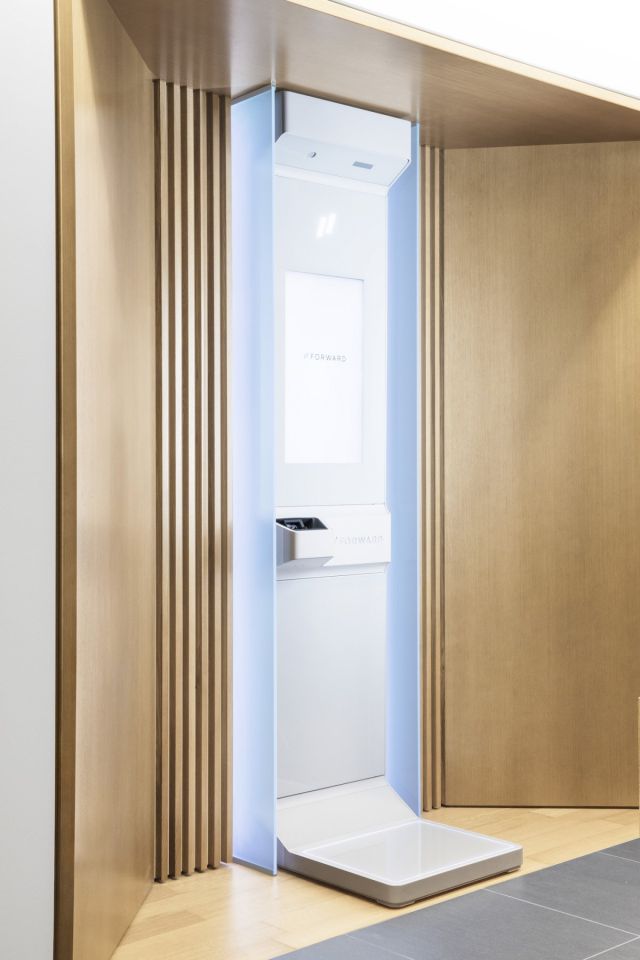The secret to a high tech concierge medical office? Data

The exam room is where the real magic happens. The first thing members see when they walk in is a massive touch screen display on the wall. Quartz
By design, the downtown San Francisco storefront offices of Forward feel more like a spa or a ritzy skin care boutique than a doctors’ office. But the latter thing is true. Despite the sun shining through floor-to-ceiling windows onto pastel walls, blond-wood surfaces and no check-in desk in sight (attractive, casually dressed receptionists with iPads offer you a water), Forward is a concierge medical service.
Adam Rogers, WIRED March 2, 2018
Insurance doesn’t get you so much as a tongue depressor down the throat at Forward. But pay $149 a month, and in return you get 24/7 access to staff via SMS and a phone app, more time with a physician, and an office tricked out with more gadgets than a starship’s sick bay. On intake, you stand in front of a sensor and put your hand into an orifice; a screen reads out your height, weight, temperature, and blood oxygenation. In the exam room, you sit in a custom-designed Comfy Chair while a doctor holds a wireless sensor against your chest and your heartbeat unspools on a giant flatscreen. Digital images from your past visits flicker across a timeline made of your health records. The key words of your conversation scroll past a cartoon of your body, picked up by discrete microphones in the ceiling (transcribed by a little natural language processing and a little bit of person-sitting-in-an-adjacent-room-listening).
The most interesting part of Forward, though, is invisible. As part of the service, Forward fetches your medical records from all your previous caregivers. Then it digitizes them—often by hand, because of the many, many incompatible data formats that bedevil medical record-keeping—with whatever genetic information you have, from the rough genotyping of a 23andMe to a whole genome sequence. And it throws in data from your wearable tech like Fitbits. In short, it’s an integrated digital medical record. Forward only has two offices, in San Francisco and Los Angeles, but even if never becomes a national brand, this idea about data looks more and more like the future.
Forward isn’t the only one chasing that future, of course. This week a start-up called Seqster, for example, went online with a sort of data locker that does something similar. It hoovers in electronic medical records from your past physicians (thanks to agreements with 1,000 providers), genome sequences, and an array of commercial wearables. It’ll even build on-the-fly visualizations of test results over time, and let you share that data with family members. And it persists even after your death. “We’ve created this engine where you can aggregate your health data and preserve it and pass it on, creating a multigenerational longitudinal record,” says Ardy Arianpour, the CEO. “And we accidentally solved the problem of interoperability, not just of electronic medical data but for genomic data and fitness/wellness data.”
Seqster and Forward’s record-keeping plan join some really ambitious projects. Verily, the health-focused Google spin-off, has Project Baseline, which uses a clever watch and other tech to collect prospective biometric information on 10,000 people and mesh it with health and genome data. Apple is trying to integrate its Watch with the HealthKit app. Government projects like Emerge and the precision medicine initiative All of Us are trying to figure this out, too. Why? Science! And also money! And kind of maybe helping the people who contribute the data.
A visit to Forward is indeed pretty cool. Before they opened their first office, Aoun and his team built out a mock-office from 2-by-4s and foamcore in a warehouse. They brought in actual patients talk to doctors, and then had the doctors meet with engineers about the design of the whole thing. The result is indeed slick; the second office is in Los Angeles. “I think the health care industry takes pride in not caring about the experience a little,” says Adrian Aoun, Forward’s CEO. And if fixing that means indulging in a little theater, well, what do you expect when investors include Ashton Kutcher and Matthew McConaughey? Part of a great experience, says Aoun, is “high tech and futuristic screens that look like Star Trek.”
It’s in the service of a larger goal. “In the world of Silicon Valley, I’m used to everyone looking at every problem, no matter how daunting, and just saying, ‘No problem, I got this,’” Aoun says. “It seems like health care, for some reason, we haven’t made that big an attack on the problem.”
If that feels like it perhaps minimizes the efforts of, like, everyone, Aoun admits he doesn’t have outcome measures that show greater success than a traditional practice—yet. The place has only been open for a few months, after all, and he says the team will be looking at how their metrics for care match up with the government’s official Healthcare Effectiveness Data and Information Set. “We need time,” Aoun says. “Our engagement metrics are through the roof.”
No question, Forward (and other concierge-style practices like One Medical or MD2) want to benefit their patients. So, ah, about that: “You get longer visits, greater acceptability of your clinician, and more patient-centered care, quote-unquote,” says Caleb Alexander, co-director of the Center for Drug Safety and Effectiveness at Johns Hopkins Bloomberg School of Public Health and lead author, over a decade ago, of a paper on concierge medicine characteristics. “But no one can tell you the outcomes. Take whatever you hear about the outcomes with a grain of salt, because there have not been rigorous studies, let alone randomized studies of patients seen in this setting versus other settings.”
In other words, sure, drop thousands of dollars to dodge lines, have better access to caregivers, and a more pleasant visit to the doctor. Just don’t expect to live longer or healthier as a result.
But surely the addition of all that data from wearable tech must make it easier for doctors to tell you if you’re healthy, or how to get you there, right? Yeah, about that: “By creating a biometric pattern, the theory is that some things will be picked up that otherwise would not,” says Sandro Galea, dean of the Boston University School of Public Health. “What you’re really doing is screening, and in order to screen you have to ask if you’re ready to intervene.” Which is to say, false positives and false negatives become more of a problem with any kind of preemptive, asymptomatic testing.

After signing in members can make their way to the body scanner — a diagnostics tool built in-house that could easily be a prop from the sophisticated lab facilities in Westworld. Quartz
What people do know about wearable fitness trackers is that they’re not as accurate as one might hope, and that people tend to stop using them. One review article said that Fitbits and Jawbones tended to undercount energy expenditure and overcount sleep, for example. It’s also worth thinking about whether steps-per-day is the right proxy for overall health. A review from earlier this year found that using wearable activity trackers had no statistically significant impact on body mass index, weight, waist circumference, body fat percentage, or blood pressure.
Maybe the accuracy of the devices will get better, and maybe they’ll begin to be a key to individualized, “precision” medicine, as some people hope. Today, right now, sensors and a sophisticated record tying all your data together may not make you, specifically, healthier. But look to your left and look to your right: It might help those people. Which is to say, integrating your entire personal and medical history—your phenotype—with your activity levels and genotype may have value to society, by allowing for a new kind of population-scale science. “Individual prediction is a totally different kettle of fish than the issue of population predictions,” Galea says. “At the population level, I think these data are very interesting.”
So for example, a pharmaceutical company might be able to discern which gene variants were associated with specific health outcomes in late life, or certain demographic groups. Maybe some activity patterns correlate to illnesses or health decades later. Who knows?
The trick is to get a lot of that data—from many different kinds of people, in an ethical, secure, private way. Forward doesn’t share data, but you can take it all with you. Seqster has a bunch of layers of consent, and expects that pharmaceutical companies and researchers will eventually come asking to look at people’s (anonymized) data. “We want to generate value for users, and then we will connect users to our partners,” Arianpour says. “We never sell your data without you being involved.” If you agree to be contacted, if someone wants your you-stuff as part of a research pool or to train a machine-learning network, they ask and you can decide if you consent. There might even be a little something in it for you. “There will be multiple ways of incentivizing the consumers,” Arianpour says. “Obviously, financially will be one.”
Source WIRED
| References |
Physicians in retainer (“Concierge”) practice. A national survey of physician, patient, and practice characteristics, Alexander GC, Kurlander J & Wynia MK. J GEN INTERN MED (2005) 20: 1079. doi: 10.1111/j.1525-1497.2005.0233.x
Systematic review of the validity and reliability of consumer-wearable activity trackers, Kelly R Evenson, Michelle M Goto, and Robert D Furberg. International Journal of Behavioral Nutrition and Physical Activity (2015) 12:159. doi: 10.1186/s12966-015-0314-1
Impact of remote patient monitoring on clinical outcomes: an updated meta-analysis of randomized controlled trials, Benjamin Noah, Michelle S Keller, Sasan Mosadeghi, Libby Stein, Sunny Johl, Sean Delshad, Vartan C Tashjian, Daniel Lew, James T Kwan, Alma Jusufagic & Brennan MR Spiegel. npj Digital Medicine volume 1, Article number: 2 (2018) doi: 10.1038/s41746-017-0002-4
Toward achieving precision health, Sanjiv Sam Gambhir, T Jessie Ge, Ophir Vermesh, and Ryan Spitle. Science Translational Medicine 28 Feb 2018: Vol. 10, Issue 430, eaao3612 DOI: 10.1126/scitranslmed.aao3612
Personalized medicine: Time for one-person trials, Schork NJ. Nature. 2015 Apr 30;520(7549):609-11. doi: 10.1038/520609a.
Also see
I was a guinea pig at Mount Sinai’s health lab of the future Fast Company
A futuristic doctor’s office in San Francisco aims to create a new operating system for health care Quartz
Moving patient data is messy, but blockchain is here to help Wired
Who’ll really benefit Verily’s exhaustive health-study? Wired
Seqster Launches Groundbreaking Platform to Solve Interoperability Across Medical, Genomics and Wellness Data Newswise
Summon the comfy chairs! The Economist
